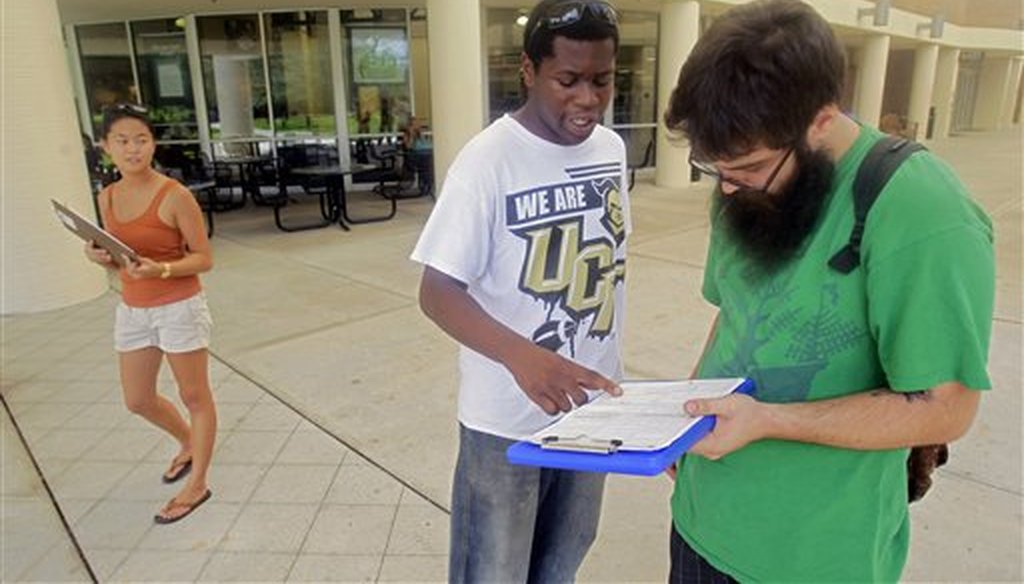Stand up for the facts!
Our only agenda is to publish the truth so you can be an informed participant in democracy.
We need your help.
I would like to contribute

In this July 31, 2012, photo, Aubrey Marks, left, watches Jordan Allen, center, as he helps student Casey Eirhstaedt, right, register to vote at the University of Central Florida in Orlando, Fla. (AP)
Rock the Vote, a group that is focused on increasing young registered voters, says that the youth vote has reached a pivotal status.
"Millennials are the largest and most diverse generation and this year we will be the largest voting block," tweeted Rock the Vote Feb. 2.
Rock the Vote calls itself a nonpartisan organization but champions some issues more associated with the left, including voting rights.
We were curious if millenials will be the largest group of voters in 2018. We don’t generally rate predictions, so we aren’t putting Rock the Vote’s claim on the Truth-O-Meter. Here, we’ll summarize what our research found.
If Rock the Vote’s tweet about the millennial voting bloc referred to eligible voters, then the organization has a point, because the size of the millennial population has been growing.
But if it refers to actual voters who cast ballots, then that’s much harder to predict. Multiple factors influence who shows up at the polls, including how energized people feel about the candidates, the impact of voter mobilization efforts and any state laws that could restrict access to the polls, including bans on student IDs.
Rock the Vote’s spokeswoman pointed to an article by the Pew Research Center about how many votes were cast by millennials in the November 2016 election. (The millennial generation isn’t a scientific term, so the particular years can vary, but Pew defined the group as ages 18 to 35 in 2016.)
Pew found that millennials reported casting 34 million votes in 2016, nearly double the number they cast in 2008. However, that generation was eclipsed in voting by the 35.7 million Gen X voters (ages 36 to 51 in 2016).
Combined, millennials and Generation Xers cast a slight majority of total votes cast, more than Boomers and older voters for the first time in decades.
This result wasn’t a surprise, because the number of millennials who are eligible to vote has been growing. As of April 2016, about 69.2 millennials were voting age — about the same as baby boomers.
Pew predicted that it is likely, but not certain, that the millennial vote will surpass Gen X in 2020. Pew made no such predictions for the midterms in 2018.
As Pew has noted, it is one thing to be eligible to vote and another entirely to cast a ballot.
"While it might be a ‘slam-dunk’ that millennials soon will be the largest generation in the electorate, it will likely be a much longer time before they are the largest bloc of voters," Pew senior researcher Richard Fry wrote in May 2016.
About half of eligible voter millennials said they voted in 2016, far below older generations.
University of Florida associate professor Michael P. McDonald said that younger people tend to drop out of the electorate at higher rates than older people in non-presidential elections.
"The growing size of the millennials will thus be balanced against their likely lower participation. I don’t know which factor will win out in November of 2018," he said.
For midterms between 1994 and 2014, the youth share of the electorate ranged between 11 and 13 percent, according to the Center for Information and Research on Civic Learning and Engagement at Tufts University.
Young people are considered low-propensity voters because they vote at rates that are lower than other groups, said Jan Leighley, a professor of government at American University. The conventional wisdom is that low-propensity voters stay home in non-presidential years.
However, there is an increase in millennials and Gen Xers who are now identified in voter registration lists, which are used by party and organizations to create voter mobilization lists. That means that these blocs might cast more ballots than in the past if parties and other groups are successful at mobilizing them.
"It might also be that with a high number of open seats in Congress (with retirements), economic/immigration issues being forefront, and pro/anti-Trump concerns motivate a lot more people to vote in the fall—which may or may not affect whether millennials will cast the largest number of ballots," she said.
Our Sources
Rock the Vote, Tweet, Feb. 2, 2018
Rock the Vote, About us, Accessed Feb. 12, 2018
Pew Fact Tank, "As GOP celebrates win, no sign of narrowing gender, age gaps," Nov. 5, 2014
Pew, "Millennials match Baby Boomers as largest generation in U.S. electorate, but will they vote?"
Pew, "Black voter turnout fell in 2016, even as a record number of Americans cast ballots," May 12, 2017
The Center for Information and Research on Civil Learning and Engagement,UPDATE – 21.5% Youth Turnout: Two-Day Estimate Comparable to Recent Midterm Years, Nov. 6, 2014
Washington Post, "Millennials aren't taking over politics just yet; They outnumber boomers - but they still vote far less often," July 31, 2017
Jan Leighley and Jonathan Nagler, "Turnout, Competitiveness and Candidate Policy Choices in Off-Year Elections," Aug. 25, 2017
PolitiFact, "Half of millennials don't associate with Democrat or Republican party, Rock the Vote says," March 17, 2014
Interview, Jen Tolentino, Rock the Vote Director of Policy & Civic Tech, Feb. 6, 2018
Interview, Peter Levine, Tufts University research professor in philosophy, Feb. 6, 2018
Interview, Molly Rohal, Pew Research Center spokesman, Feb. 6, 2018
Interview, Jan Leighley, American University government professor, Feb. 8, 2018
Interview, Michael P. McDonald, University of Florida associate professor of political science, Feb. 8, 2018
































